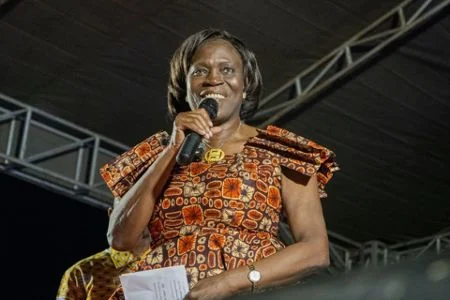Simone Gbagbo, Ivory Coast’s former first lady and a polarizing figure once pursued by the International Criminal Court, is charging into the 2025 presidential race.
At 76, the “Iron Lady” faces off against President Alassane Ouattara, who’s favored to clinch a fourth term on October 25. Gbagbo, now leading her own party, aims to reshape the nation’s future without her ex-husband, Laurent Gbagbo, by her side.
Her campaign, rooted in social democratic ideals, promises national healing and bold reforms. As Ivory Coast’s most prominent challenger, she’s leveraging decades of political grit to rally voters and position herself as the opposition’s new voice.
From Crisis to Candidate
Gbagbo’s political journey is steeped in turmoil. She was a key figure during Laurent Gbagbo’s presidency, marked by civil war from 2002 to 2007 and a bloody 2010 election dispute. When Laurent refused to concede defeat to Ouattara, violence erupted, killing about 3,000 people.
The couple’s 2011 arrest in Abidjan ended their reign, with Simone facing a 20-year sentence for state crimes in 2015. Ouattara’s 2018 amnesty freed her, a move seen as easing political tensions.
After Laurent filed for divorce in 2021, Simone launched the Movement of Skilled Generations in 2022. “I’m above the ministers,” she once told a French outlet, reflecting her commanding presence. Her new party seeks to fill the void left by Laurent and other barred candidates like Tidjane Thiam.
A Platform for Change
Gbagbo’s campaign centers on reconciliation to heal Ivory Coast’s wounds. She proposes an amnesty law to free political prisoners and bring exiles home, addressing the scars of past violence.
As the world’s top cocoa producer, she also pushes for “true monetary autonomy,” advocating a new subregional currency to replace the euro-linked CFA franc. This bold move aims to boost economic independence.
She supports West Africa’s Alliance of Sahel States Burkina Faso, Mali, and Niger where coup leaders challenge regional norms, contrasting Ouattara’s stance. Her platform resonates with those seeking a break from the status quo.
Political Roots and Resilience
Gbagbo’s career began in the 1970s as a trade unionist fighting single-party rule under Felix Houphouet-Boigny. In the 1980s, she co-founded the Ivorian Popular Front with Laurent, whom she married in 1989.
Elected to the National Assembly in 1995, she built a reputation as a fierce opposition leader. Her defiance during the 2011 crisis cemented her as a symbol of resistance, even as she faced trial while Laurent was sent to The Hague.
Political analyst Arthur Banga sees her run as strategic.
“She won’t win now her party’s base is small but she’s eyeing 2030,” he said. With Ouattara, 83, likely in his final race, Gbagbo could lead the opposition post-election.
Campaign Gains Momentum
This month, Charles Ble Goude, a former ally of Laurent acquitted by the ICC in 2019, endorsed Gbagbo. “She’s a pragmatic fighter,” Banga noted, praising her ability to connect with voters.
Her May 2025 rally in Abidjan, pushing for inclusive elections, drew crowds and sparked #Simone2025 hashtags online.
Ivory Coast’s history of ethnic and political divides fuels her call for unity. Her campaign blends bold vision with practical steps, appealing to youth and those tired of old rivalries.
Looking to 2030
Gbagbo’s candidacy is a long game. While Ouattara’s grip remains strong, her run builds legitimacy for future battles. Ivory Coast, a cocoa powerhouse, craves stability and growth. Gbagbo’s reconciliation and economic plans could reshape the nation’s path, setting the stage for a new era as 2030 looms.
READ ALSO: Nigeria Rejects Coup Rumors, Affirms Democratic Commitment




















